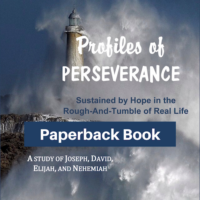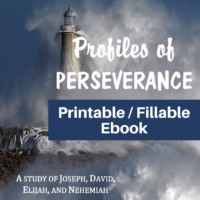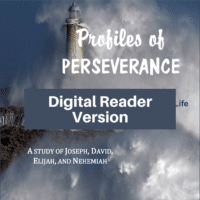Elijah: The God of the Impossible Situation • 1 Kings 17

Ai was not used to generate this post.
Are you in an impossible situation? Do you have confidence in your knowledge of God so that you can trust Him with that impossible situation? This is post #8 in the Old Testament Men blog series. In the last article, we looked at how God’s grace to David helped him to pick up the pieces and move forward when he made a horrendous mistake. In this post, we will learn that our God is a God of the impossible situation. Elijah is our example.
Key Takeaways
- The article discusses how faith can help navigate impossible situations, using the example of the prophet Elijah.
- Elijah’s encounters with impossible situations illustrate God’s provision and protection in times of difficulty.
- The author emphasizes the importance of studying God’s Word and learning theology by experience.
- Practical lessons include preparing through instruction and being open to learning through life experiences.
- The article encourages readers to trust God with their challenges and highlights the hope found in perseverance.
A Prophet of God
Elijah suddenly appears in 1 Kings chapter 17:
Now Elijah the Tishbite, from Tishbe in Gilead, said to Ahab, “As the Lord, the God of Israel, lives, whom I serve, there will be neither dew nor rain in the next few years except at my word.” (1 Kings 17:1)
ELIJAH. Even in pronouncing his name, there’s a tendency to say it with emphasis and power. No wonder. His name combines 2 names for God. The first part El is from Elohim, which is a generic, name for God and references the God of power who is also the Creator. The second part jah is from Yahweh, which is the personal name God told the Hebrews to call Him. This name refers to the relational, gracious, promise-keeping God. So Elijah’s name means My God is Yahweh. This was his choice and his message. “Yahweh, whom I serve.” Elijah was a prophet.
What was a prophet?
Both nations, Israel and Judah, were falling deep into idol-worship, so God chose special men and women to be prophets. The root Hebrew word translated “prophet” refers to someone being under divine influence, divine referring to a spiritual being. Those under God’s influence spoke God’s words to the people or praised Him visibly (1 Samuel 19:23-24). They prophesied or were visibly under the Holy Spirit’s control. Those under demonic control spoke deceiving words usually with the purpose of drawing attention away from God’s message. These are frequently called false prophets in the Old Testament and false teachers in the New Testament.
Who were God’s prophets?
God’s prophets, men or women, were chosen by Him to deliver messages from Him through writing or speaking or both. They could minister locally or to the nation as a whole. Some prophets, like Elijah, were commissioned to a lifetime of service to God, while others performed one simple, yet important job. The Old Testament books Isaiah through Malachi are written by prophets. Elijah and his successor Elisha do not have any named writings.
Also in Israel were schools of prophets similar to our modern seminaries where men studied God’s Word and made themselves available to be used by God for teaching, worship and service. God’s national prophets such as Samuel, Elijah and Elisha would teach at these schools. That’s probably why the students are sometimes called “sons of the prophets.” All responded to God’s call to give His messages to both kings and ordinary people.
Prophets taught people about God
Prophets knew God. They knew who He was and understood His character. We call that theology. They taught people about God. David was a prophet in that sense. Prophets didn’t just predict future events, what we usually associate with prophets and prophecy, but they more often taught people in the present about the God they served or claimed to serve. Prophets knew God. They knew who He was and understood His character. They taught people about God. They were held accountable to what they said (Deuteronomy 18:22).
Where do we learn theology?
You don’t need to go to seminary or read theology books to learn theology. You can get head knowledge that way. But it also biases you to think that only professionals and academics who write books can know theology. Regularly reading and studying God’s Word will teach you theology because God reveals Himself to us in His word. But there’s more.
You learn theology like you learn most anything else in life—Prepare by instruction, Learn by experience. In fact, apart from experience, theology is dull and detached. It’s as we look at the lives of real people and see God at work in their lives, as well as our own, that we learn true theology. It’s as we study the truth about God then trust Him with our lives that we learn true theology.
Prepare By Instruction—Study The Truths About God
Prepare by instruction means that you study the truths about God. You learn them from God’s Word and solid biblical teaching. This is why we are commanded by God repeatedly in Scripture to train our children about Him so they won’t forget. One of the saddest verses in the Bible is this,
After that whole generation had been gathered to their fathers, another generation grew up, who knew neither the Lord nor what He had done for Israel. (Judges 2:10)
Sunday School, VBS, AWANA, Childcare Classes—all those teach children the truth about God. Our hope is that some are paying attention and will remember what they’ve learned when trouble hits.
It’s as we look at the lives of real people and see God at work in their lives, as well as our own, that we learn true theology. It’s as we study the truth about God then trust Him with our lives that we learn true theology. That is why studying Old Testament people like Elijah is important to our lives today.
Learn by Experience—Trust in What You Believe about God
Many people in the Bible learned truth about God through experience. In fact, they attributed names to God based upon what they learned to be true about Him. El Shaddai and Adonai Sabbaoth are two names translated “God Almighty or Lord Almighty.” Elijah used this name in 1 Kings 18:15. Abraham used the name Yahweh Yir’eh (“the Lord will provide”) when he was called upon to sacrifice his son Isaac but God provided a ram instead. The woman who had been bleeding for 12 years learned about God when she touched the hem of Jesus’ robe and was instantly healed. Yhwh Rapa, the Lord who heals or “restores to normal.”
Read more about this precious woman in the blog, “Mark 5 • Desperate Woman, Jesus satisfies your heart with HOPE.”
Impossible Situation #1: Confront King Ahab
The setting
Back to Elijah. This is his first impossible situation when he confronts the very wicked king of Israel, Ahab, in his capital city Samaria. Ahab and his even more wicked wife Jezebel had pushed Israel into the blatant worship of the Phoenician god Baal. Jezebel was killing off as many of God’s prophets that she could find. God was not happy about any of this. He sent Elijah to say so.
Now Elijah the Tishbite, from the Gilead settlers, said to Ahab, “As the Lord God of Israel lives, in whose presence I stand, there will be no dew or rain during these years except by my command!” (1 Kings 17:1 CSB)
Elijah takes his stand
Whereas the NIV says “whom I serve” regarding God, most translations say “in whose presence I stand.” The Hebrew word used there means “to present oneself, to hold one’s ground, and to station oneself.” Picture Elijah being physically in the presence of King Ahab as he issued the drought declaration. But in his mind and heart, he was standing in front of God. Don’t you love that? We can do that too whenever we confront people. Take your stand.
Where did Elijah learn about God? We don’t know about his background. But someone had prepared him by instruction. A mother or father or local priest? Perhaps he attended one of those “prophets” schools.
Where did he learn the truth about God through experience? God gave him lots of experiences to test his theology and trust in God.
Impossible Situation #2: Brookside Hiding Place
Immediately after Elijah made that declaration to Ahab, God sent him to a place east of the Jordan River called the Kerith Ravine.
Then the word of the Lord came to Elijah: “Leave here, turn eastward and hide in the Kerith Ravine, east of the Jordan. You will drink from the brook, and I have directed the ravens to supply you with food there.” So he did what the Lord had told him. He went to the Kerith Ravine, east of the Jordan, and stayed there. The ravens brought him bread and meat in the morning and bread and meat in the evening, and he drank from the brook. (1 Kings 17:2-6)
Elijah was sent out of Israel to a lonely place. What could God have been doing? Why make it so hard on him? Why not have him preaching all over Israel?
We are told that God moved Elijah for his protection and provision. I believe God had in mind his preparation as well. Let’s examine these.
Protection
Elijah had to hide because he would be hunted by the king and queen. There was a real danger for him. Hiding means a loss of independence. You are forced to trust in someone or something besides yourself.
Have you ever been moved away from an evil influence or danger? At first, we don’t like those times because God may:
- Cut down or cut off something we like in order for us to grow and mature
- Whittle at our pride by removing us from the limelight or from involvement
- Chip away at the status we have erected for ourselves so we are humbled enough to depend on Him
- Prod us by making us release our rights, the rights we hold onto and try to defend, including the right to choose the way we want to live
- Cut through our habits to renovate us from the inside out.
Through experience, we can become convinced of who God is. He gives us opportunity to sharpen our theology!
Provision
Kerith Ravine was remote, away from the usual sources of food. So God promised to provide it through “Raven’s Catering Service.” But he wasn’t doing the choosing; the ravens were—twice a day. Ravens eat just about anything—insects, fruit, nuts, seeds, eggs, baby birds, small mammals, and dead tissue. I am sure that whatever they brought was approved by God so probably no dead tissue. Ravens are entertaining creatures, so they probably kept him company as well.
Have you ever been fed by God’s ravens? Sure you have. You just didn’t know they were God’s ravens. Have you received meals from friends when you were sick or hurt or in grief? Have you provided meals or other help to any woman or family in distress? God’s ravens are still feeding.
Several years ago, my husband Ron’s prosperous business suddenly was without any clients. We had no work for more than a year. God fed me and my family through ravens. They brought bags of groceries to our house or to the church to surprise me. They tucked $20 bills in my hand, purse, or Bible when I wasn’t looking. They shared their lunch with me when we went out to eat, so I didn’t have to miss the fellowship. A little of what was on their plates found its way onto mine.
Let me throw in something about contentment here. Can we pursue the “American Dream” and still be Jesus’ disciple? Is it possible in this American culture to be content? Perhaps only if we redefine the object of our contentment.
Compare these two passages:
- Deuteronomy 2:7. At the end of 40 years of nomadic life in the desert, with manna in the morning and quail every night for supper, no house or farm or new shoes, “These forty years the Lord has been with you and you have lacked nothing.”
- Deuteronomy 8:7-9. In the new land, filled with food and resources, they “will lack nothing.”
In both situations, they “lack nothing” that they need at the time. The concentration should be on what you have, not what you don’t have.
When we are in our own “Kerith Ravine,” God doesn’t forget us. Isaiah 49:15 declares that we are engraved on the palm of His hand. He knows where I am, where you are. Our response is to be thankful and content and to trust God to take care of us in whatever manner He chooses. That includes being content with raven food! That’s living by faith in a faithful God.
Read more about being content in any situation from this blog, “Philippians 4:4-23 • Live Joyfully Without Worry.”
Preparation
For Elijah
God used Kerith Ravine as a place of preparation for what was coming next in Elijah’s life. That involved getting to know God better.
So what did Elijah learn about God? “God keeps His Word to stop the rain. God can protect me. God can provide even my basic needs. God can truly be trusted.”
What did Elijah learn about himself? “I need to be thankful for whatever God provides. To be content with where I am. To be ready to move when God says ‘Go.'”
God was nourishing not only his body, but also Elijah’s faith. Just think about the wonderful prayer time Elijah must have had with God. Perhaps he had access to a portion of the scripture or dwelt on all the passages he had memorized.
Elijah was removed from all kinds of distractions. There was time to concentrate on his relationship with his creator.
For me
Elijah’s experience reminds me of an episode in my life. I consider my spiritual awakening to be at the age of 19 when my childlike faith became affirmed and secure. A few months later, I was required to spend a whole summer outside of Colorado Springs, CO at Geology Summer Camp. Wow! Who wouldn’t want that? Me. That was the same summer of a big Christian conference in Dallas called Explo 72. Many of my friends were attending that. Of course, I wanted to go there rather than to Colorado. My parents insisted that I not sacrifice a whole summer course for only 1 week. So I went to Colorado.
As a new Christian, I felt alone because there was really only 1 other Christian there. And she wasn’t very vocal. I was surrounded by evolutionists who ridiculed belief in God taking the Bible seriously. So what did I do? I read the Bible more at night when alone in my bunk. The first Saturday after camp started, someone gave me a ride to a Christian book store. While just looking around, I found several books on scientific creation including one called The Genesis Flood. That’s where my interest in the subject of creation science began.
During that 6 weeks, I had lots of solo time where I could sing and pray from the mountaintops while doing my mapping or other work. We took field trips where I saw evidence of the Genesis Flood everywhere. The professor would show us a formation and say that evidence shows it had been deposited rapidly. I saw dead things buried in rock layers laid down by water all over Colorado. Evidence for the Flood was consistently before my eyes.
For help in seeing the evidence for creation around you, get our “Connecting Faith to Life on Planet Earth Bible Study.”
My knowledge of God as creator and my confidence in the truth of scripture from the very first verse were firmly set during that experience. It was hard. I felt alone at times. But I really got close to the Lord.
Sometimes a move to a new environment forces us to give up distractions so that we have a lot more time to spend in dwelling upon God and preparing for future service to Him. Isn’t that the reason for attending “retreats” once a year?
Impossible Situation #3: The Brook Dries Up!
Okay, Elijah is adjusting to being alone, being fed by ravens, and drinking from the brook. But then, the brook dried up (1 Kings 17:7). Elijah’s watching the brook dry up. Here’s another impossible situation.
Elijah might have been thinking to himself, “I know God will do something. I just don’t know what and when.”
Chuck Swindoll says in his sermon series on Elijah,
The God who gave the water has chosen to take the water. It’s His sovereign right! He gives the child; he can take it away. He gives the business; He can take it away. He’s given the house, He can take it away. (Chuck Swindoll, Elijah sermons)
How do you like that?
In this impossible situation, Elijah was truly living by faith while following God’s direct commands. Living by faith is simply a trust in someone who is trustworthy—the object of our faith. For a Christian, the object of our faith is God. Another reason you need to know THEOLOGY.
Impossible Situation #4: Depend on a Gentile Widow
Where do we use our theology? We use it all the time, especially when life hits, when we get to the next impossible situation. Elijah had learned that God would miraculously provide for him, but now he would learn that God could do the same for others as well.
Then the word of the Lord came to him: “Go at once to Zarephath in the region of Sidon and stay there. I have directed a widow there to supply you with food.” So he went to Zarephath. … She went away and did as Elijah had told her. So there was food every day for Elijah and for the woman and her family. For the jar of flour was not used up and the jug of oil did not run dry, in keeping with the word of the Lord spoken by Elijah. (1 Kings 17:8-10, 15-16)
God was again using an unusual source to feed His prophet. First birds, then a woman—and she wasn’t even Jewish! This is totally opposite of what you would expect.
Interestingly enough, the name Zarephath means melting, crucible. So Elijah’s next impossible situation would be one of refining. It’s hard to be refined if you are alone. It’s that interaction with others that usually reveals our weaknesses and impurities.
Women are the theologians of their homes. Elijah, the widow, and her son learned that God is greater than any impossible situation. Both the woman and her son learned to trust Him. Elijah and the widow learned to follow directions even when it made no sense. That is so hard for us. I have covered the widow’s story in more detail in another blog.
Read more about Elijah and the widow in this blog, “Two Widows • 4 Lessons to Learn about God’s Provision.”
Lesson Wrap-up
Lesson #1: Prepare by instruction those within our sphere of influence, including ourselves.
Take advantage of whatever resources are available. Be serious about knowing Him. Study the Scriptures with that intention. Nurture your faith on the truth of our God’s character. Fix your eyes on Jesus with your mind filled with the truth about Him. Teach children and others the truth about God. Take this job seriously. You never know how much sinks in and how it will sustain them later in life.
Lesson #2: Be ready to learn by experience
Be willing to be moved out of your familiar surroundings. When God moves us, it may be for our protection, provision, or preparation. God’s direction includes God’s provision. It is still His choice of what He gives or takes away. We must be as willing to be set aside as we are willing to be used. A hidden life is a valuable life when you are functioning well, trusting God with each day. Joseph was hidden in prison for two years. He functioned well and it was noticed. If you are a mom of small children or caring for an elderly person in your home, you may be set aside from doing other things for God during this time. Your life is valuable to those who need you so desperately right now. Don’t resent it. Elijah had to learn to trust God one day at a time. God didn’t tell Elijah the next step until he took the first step.
Think about the impossible situations facing you today. Trust God and take the next step. Depend upon Him to lead you.
Are You Ready for Perseverance in Your Life?
As the Bible promises,
For whatever was written in earlier times was written for our instruction, that through perseverance and the encouragement of the Scriptures we might have hope. (Romans 15:4 NASB)
We can have hope because we have God with us. So remember our lane markers for the race.
- Choose to persevere through every challenge.
- Count on God’s promise to give you hope.
- Let that hope sustain you through the rough-and-tumble of life.
- Celebrate the joyful reward.

Let Jesus satisfy your heart with hope as you persevere through everyday life.
Read all the articles in our Old Testament Men series. In the next post, we will learn from Elijah’s next impossible situation that our God is a God you can really know and can really trust.
All of the above information is covered in the Profiles of Perseverance Bible Study covering the lives of Joseph, David, Elijah, and Nehemiah.
Ai was not used to generate this post.


